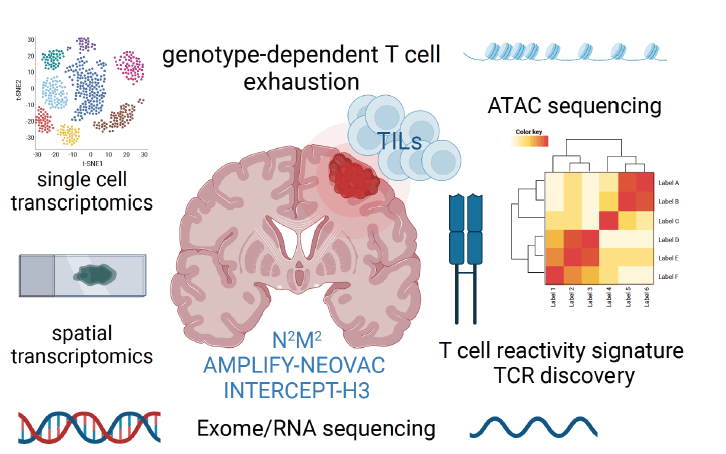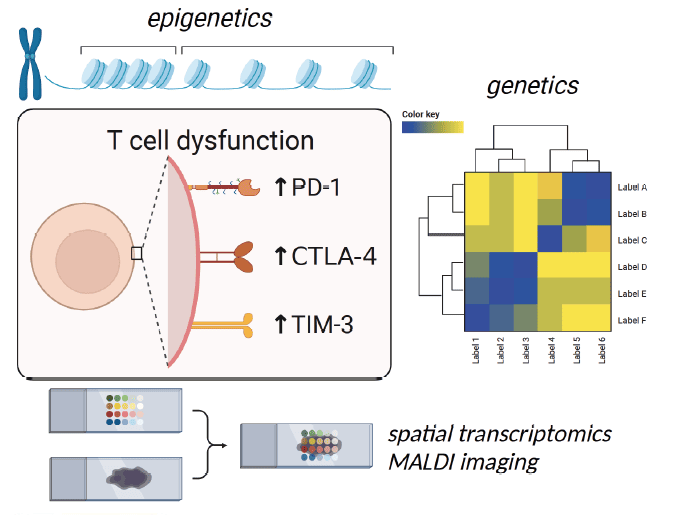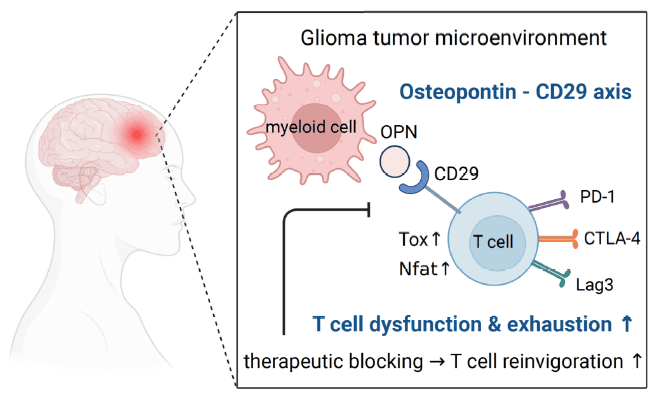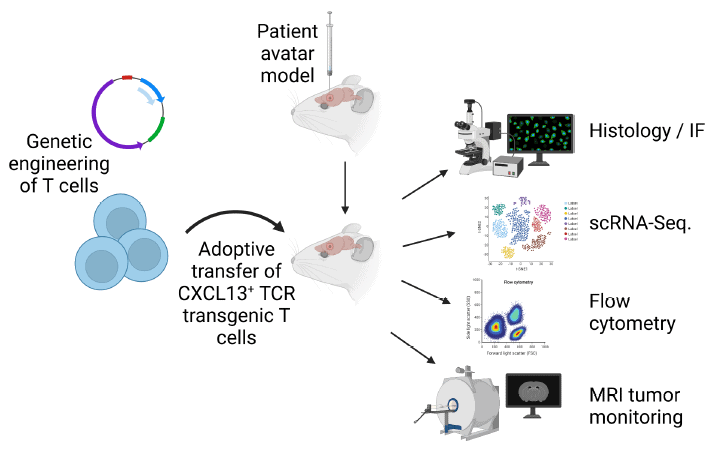Research > Focus B > Work Packages B01
Summary
Based on work in the first funding period, we will specifically study mechanisms of resistance to therapies employing glioma-specific T cells. A focus will be on strategies to enhance T cell homing and to overcome T cell dysfunction in the glioblastoma microenvironment. Furthermore, the analysis of post-treatment human glioma tissue from clinical trials and defined transgenic T cells recognizing glioma antigens allows testing hypotheses on determinants of metabolic, genetic, and exogenous factors defining T cell states in the glioblastoma microenvironment.
Task 1
Identify molecular determinants of genotype-dependent T cell exhaustion in the glioma microenvironment
Steps / Workflow
- Define relevance of mutational load via CV in hypermutated GBM
- Define antigens and TCR Molecular and functional profiles of tumor-associated immune cell subsets
Task 2
Understand the metabolic, genetic and epigenetic determinants of T cell dysfunction preventing response to immune checkpoint inhibition
Steps / Workflow
- Define genetic determinants of T cell dysfunction and discover epigenetic biomarkers of response to ICI.
- Investigate spatial distribution of reactive T cells Metabolic profiling of T cell dysfunction with MALDI
- Novel imaging of metabolites
Task 3
Validate the osteopontin-CD29 pathway on activated T cells as a key and therapeutically targetable signalling event promoting T cell exhaustion in the glioma microenvironment
Steps / Workflow
- Evaluation of CD29 blocking antibodies to prevent T cell exhaustion in experimental glioma
- Generation of genetic models targeting CD29 on T cells and myeloid OPN
- Profiling T cells function of CD29 deficient adoptively transferred TCR-transgenic T cells
Task 4
Develop genetic engineering strategies to improve homing and resilience of T cell receptor transgenic T cells for adoptive transfer
Steps / Workflow
- Evaluation of genetic engineering techniques and adoptive transfer of CXCL13 overexpressing TCR transgenic T cells
- Flow cytometry + scRNA Seq. + Histology + MRI monitoring Evaluation of improved T cell homing and its therapeutic effect + transcriptomic features of modified T cells

BUNSE, THERESA, NEE SCHUMACHER, DR. RER. NAT.
Heidelberg University, Mannheim Medical Faculty, University Hospital Mannheim, Department of Neurology, Theodor-Kutzer-Ufer 1-3, 68167 Mannheim, Germany
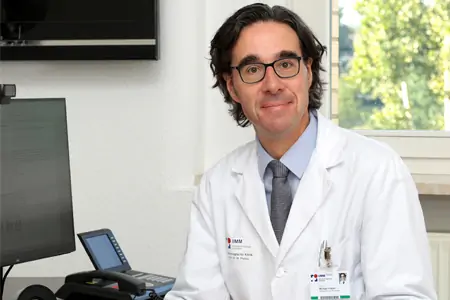
PLATTEN, MICHAEL, PROF. DR. MED.
Heidelberg University, Mannheim Medical Faculty, Mannheim University Hospital (UMM), Department of Neurology & DKFZ, Clinical Cooperation Unit Neuroimmunology and Brain Tumor Immunology, Theodor-Kutzer-Ufer 1-3, 68167, Mannheim, Germany
Address
Im Neuenheimer Feld 400
69120 Heidelberg
Themen
Research
- Focus A
- A01: Targeting tumor cell network communication to overcome primary and adaptive resistance in glioblastoma
- A02: Development of a specific combination therapy for histone H3-mutant pediatric glioblastoma
- A03: Deciphering resistance against targeted treatments
- A04: Elucidating tumor-associated microglia interactions in astrocytomas CNS WHO-grade 4
- A05: Predictive biomarkers for MGMT-promoter-methylated glioblastoma (2019 – 2023)
- A06: Resistance mechanisms of glioblastoma against alkylating agents and radiotherapy
- A07: Mapping and targeting neuron-tumor networks to tackle therapy resistance in glioblastoma
- A08: Personalized glioblastoma treatment guided by patient-derived tumor organoids
Research
- Focus B
- B01: Mechanisms of response and resistance to glioma-specific t cells
- B02: DNA mis-match repair regulates immune checkpoint blockade therapy in glioblastoma (2019 – 2023)
- B03: Targeting immunosuppressive programs in isocitrate dehydrogenase mutant gliomas
- B04: Impact of myeloid cells on the adaptive immune response in newly diagnosed and recurrent glioblastomas
- B05: Dissecting the response of glioblastoma and its tumor microenvironment to focused high-dose radiotherapy (2019 – 2023)
- B06: Visualization and characterization of immune responses in H3K27M mutant gliomas
Research
- Focus C
- C01: Comprehensive preclinical pharmacology testing of drugs used for glioblastoma treatment
- C02: Radiomics, radiogenomics and deep-learning in neurooncology
- C03: Imaging immune signatures of glioma response and resistance towards immunotherapy (2019 – 2023)
- C04: Metabolic signaling in glioblastoma: a spatial multi-omics approach
- C05: Overcoming glioma radio-resistance with particle therapy
- C06: Functional characterization of EGFR structural variants associated with long-term survival in glioblastoma, IDH-WT


